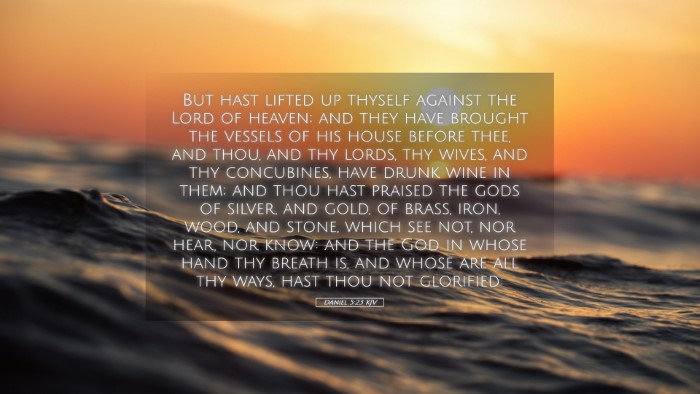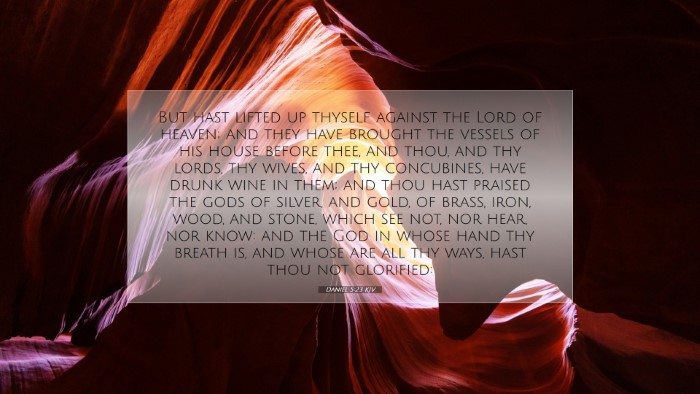Commentary on Daniel 5:23
Daniel 5:23 states: "But hast lifted up thyself against the Lord of heaven; and they have brought the vessels of his house before thee, and thou, and thy lords, thy wives, and thy concubines, have drunk wine in them; and thou hast praised the gods of silver, and gold, of brass, iron, wood, and stone, which see not, nor hear, nor know: and the God in whose hand thy breath is, and whose are all thy ways, hast thou not glorified."
Contextual Understanding
This passage is part of the narrative concerning King Belshazzar of Babylon, who hosted a grand feast, defiling the sacred vessels taken from the Jerusalem temple. Daniel, the prophet, is called upon to interpret the writing on the wall that appeared during the feast. In this verse, Daniel confronts Belshazzar, outlining his egregious actions against God.
Key Themes
- Profaning the Sacred: Belshazzar's use of the Jewish temple vessels for drinking wine highlights a blatant disrespect for God and His holy things.
- Idolatry: The king's praise for false gods demonstrates the folly of idolatry, as these gods are lifeless and powerless.
- Divine Sovereignty: The passage underscores the belief that God is ultimately in control of all things, including the king's very breath.
Commentary Insights
Matthew Henry's Commentary
Matthew Henry emphasizes that Belshazzar's arrogance was a direct challenge to the sovereignty of God. By taking the vessels of the temple and using them for a feast, Belshazzar not only disrespected God’s holiness but also showed his disdain for the God of Israel. Henry notes the importance of recognizing God's authority over all human affairs and the consequences that come from ignoring this fundamental truth.
Albert Barnes' Notes
Albert Barnes expounds on the significance of the phrase "the God in whose hand thy breath is." He argues that this illustrates God's absolute control over life and existence. Belshazzar’s failure to acknowledge this reality signifies a profound moral blindness. Barnes also points out the irony of praising powerless idols while rejecting the source of all power and life.
Adam Clarke's Commentary
Adam Clarke delves into the implications of Belshazzar's actions, illustrating the gravity of using the consecrated utensils for common purposes. He highlights that such behavior not only invites divine judgment but also reveals a lack of reverence toward God. Clarke also discusses the futility of idol worship, noting that the gods of silver and gold are incapable of any form of help or guidance.
Theological Reflections
This verse invites several theological reflections suitable for preaching and teaching:
- The Nature of Idolatry: In modern contexts, believers are challenged to examine what 'idols' they may be uplifting in their own lives, anything that takes precedence over honoring God.
- Divine Judgment: The historical account serves as a warning about the seriousness of disregarding God's sovereignty, particularly in leadership roles.
- The Holiness of God: The sanctity of the items used in worship reminds believers to approach God with reverence and respect, maintaining the holiness of worship practices.
- The Importance of Acknowledging God: The call to glorify God in all aspects of life resonates deeply; neglecting this leads to spiritual blindness and moral decay.
Conclusion
In summary, Daniel 5:23 serves as a profound reminder for pastors, students, and scholars alike: the eternal truth of God’s sovereignty must not be underestimated. The consequences of pride, idolatry, and irreverence communicated in this verse reverberate through time, urging a posture of humility and devotion to the one true God.


